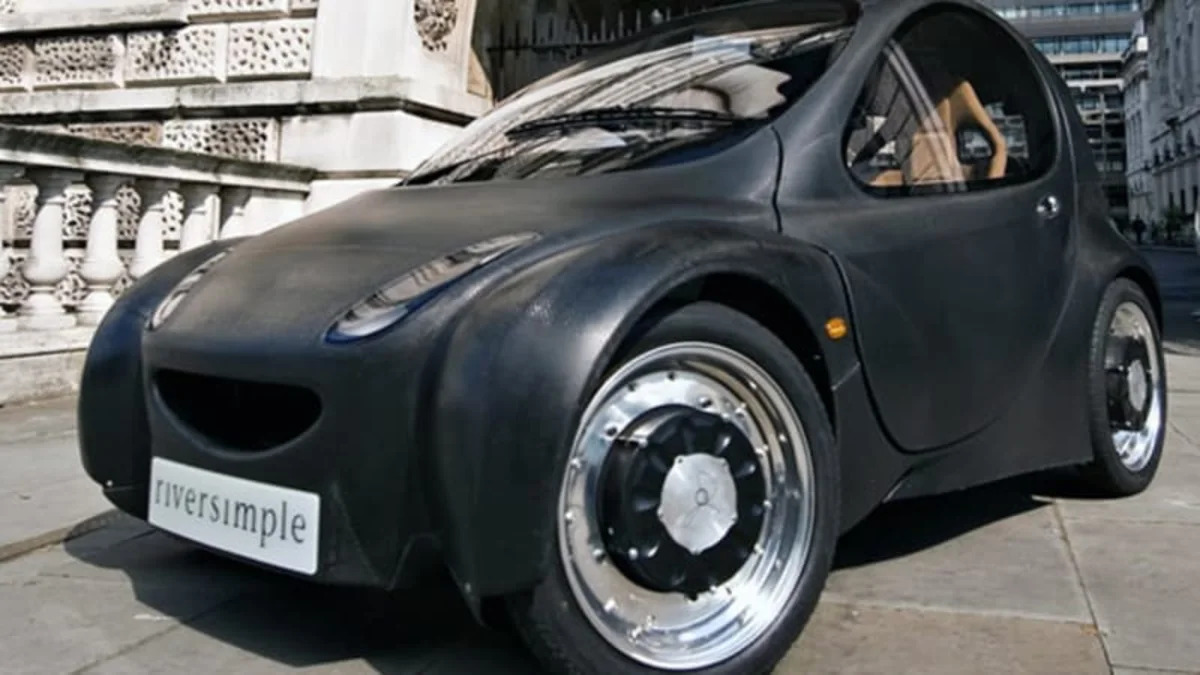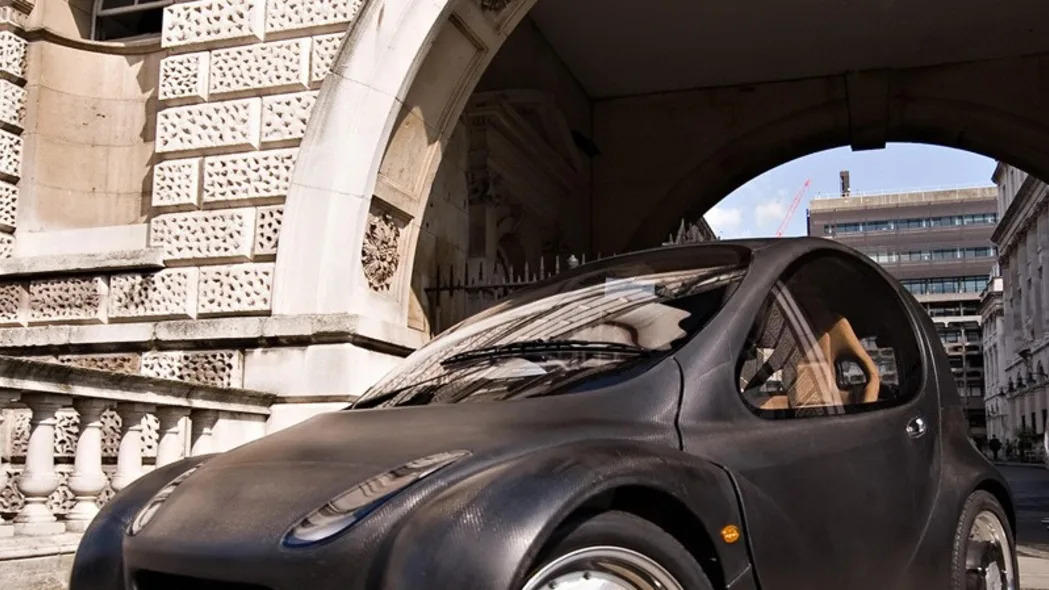RiverSimple hydrogen fuel cell car – Click above for high-res image gallery
The Riversimple fuel cell car unveiled in London today breaks a lot of the rules for what we expect a hydrogen vehicle to be. First, it's not trying to be a replacement for a regular car (see: these SUVs or this truck). Instead, it's very small and only seats two. Second, the usual proprietary secrets that go into designing and building the fuel cell have been replaced with an open source model, with all the designs and information due to be placed online for free. Third, and most dramatically, this car is cheap.
According to Horizon Fuel Cell Technologies, the company that developed the fuel cell used in the Riversimple, "This innovative car could be made available to consumers for just 200 pounds Sterling ($315) per month." Compare this to the lease or purchase prices of other advanced technology vehicles. The MINI E, for example, costs $850 a month for a year. The Honda FCX Clarity is $600 a month for three years. Sure, these are very different vehicles and, in the case of the MINI E, different technologies, but a lot of people shop with their wallets, and $315 beats $850 easily. When we first learned about the car last week, we heard that the lease period is a reported 20 years, so that would certainly take the bloom off the rose a bit.
Riversimple plans to start leasing the car by 2013. It has a 240-mile range on a full charge of its small 1 kg hydrogen tank and can go up to 50 mph thanks to ultracapacitors and a 6 kW fuel cell. The company says it has "an efficiency equivalent to 300 miles to the gallon." Look for 10 prototype vehicles to hit the U.K. sometime next year. Of course, thanks to the open source model, if you want to DIY this one, you might be able to beat that timeline. There's a full press release and video of the car after the jump. Thanks to everyone who sent this in!
[Source: Horizon Fuel Cell Technologies, Guardian UK, BBC, Riversimple | Photo by Leon Neal/AFP/Getty]
The video meant to be presented here is no longer available. Sorry for the inconvenience.
PRESS RELEASE:
Horizon's Fuel Cells Power the World's First Affordable Hydrogen Car
LONDON, June 16 /PRNewswire/ -- Today a new generation of fuel cells developed by Horizon Fuel Cell Technologies has enabled the world's first low-cost and practical hydrogen car. The top secret UK development unveiled today in London is a two-seater zero emissions hydrogen-electric city car with an expected fuel consumption equivalent to 360 miles per gallon*, six times better than today's best available hybrid electric vehicles. What's more, this innovative car could be made available to consumers for just 200 pounds Sterling ($315) per month.
Developed by Riversimple, the small city car integrates a 6kW fuel cell from Horizon Fuel Cell Technologies. The vehicle maximizes energy efficiency by utilizing lightweight composite materials, eliminating heavy mechanical component, and by networking fuel cells with ultra capacitors and 60% regenerative braking energy into one symbiotic system. The result is ground-breaking: 240 miles (390 km) can be traveled on one small tank of hydrogen weighing only 2.2 lbs (1 kilogram).
Hugo Spowers, founder of Riversimple said, "Horizon's approach to commercialization of fuel cells perfectly complements our approach to bringing hydrogen fuel cell cars to market. Thanks to this partnership, we believe that we are closer to market with a commercially viable fuel cell car than anyone else in the world."
The networked fuel cell power-train design led to a reduction in fuel cell power requirements by a factor of 6 compared to other urban vehicles of similar performance and by a factor of 15 compared to other fuel cell prototype vehicles - an effort further magnified by Horizon's ability to supply high power fuel cells at greatly reduced costs.
"Many people lost track of the fact that fuel cell cars are electric cars, since fuel cells store and deliver electrical energy, just like batteries - only with significantly more storable energy per unit of weight. Batteries and ultra capacitors on the other hand, offer more power per unit of weight, but less storable energy," said Taras Wankewycz, one of Horizon Fuel Cell Technologies' founders. "Technologies have evolved, but more importantly, Riversimple brought them together as one system, in a way that greatly exceeds the sum of their individual benefits. This next generation hydrogen-electric car brings electric vehicles into a new stage where range, charge-time and cost are no longer commercial barriers."
The Riversimple car will be commercialized internationally using an "open-source" production model inspired by the software industry, creating new entrepreneurial possibilities around the world and the promise of car manufacturing jobs within the communities where the vehicle is used. Because the car can be produced and maintained locally, the carbon footprint associated to century-old models of centralized car manufacturing and distribution is also significantly reduced.
Fuel Cells and Refueling
A fuel cell converts the chemical energy of hydrogen into usable electric energy without combustion, with water as its only by-product. Unlike batteries, fuel cells separate energy storage and energy conversion functions. If used as a primary source of power like many fuel cell vehicle developments to date, fuel cells can become extremely expensive as power needs impacts their size. But when changing the configuration and coupling the high energy density quality of fuel cells with higher power density ultra-capacitors, it is possible to greatly increase the performance of electric vehicles while reducing their cost. Ultra-capacitors are charged by the car's regenerative braking system, providing power for acceleration. By de-coupling acceleration from cruising, a much smaller, lower power and lower cost fuel cell can be used.
With a smaller fuel cell consuming much less hydrogen, the vehicle no longer depends on large storage tanks, which greatly reduces the costs and complexities so far associated with hydrogen supply. Working simultaneously with BOC to make hydrogen affordable, sustainable and readily available for refueling, what many believed would be twenty or thirty years away can be done today by using an existing industrial hydrogen supply system.
Horizon started commercializing fuel cells four years ago from small and simple products to larger energy storage solutions. The company is emerging as a world leader in the commercialization of fuel cell integrated energy solutions and offers a complete range of products and solutions for the consumer, industrial and transportation markets. Horizon's new multi-kilowatt systems, which are currently being adopted in various applications including cellular telecommunication sites, can store significantly more electrical energy than batteries.
* Note:
mpg (UK) mpg US l/100km km/l
300.00 360.28 0.94 106.20



Sign in to post
Please sign in to leave a comment.
Continue